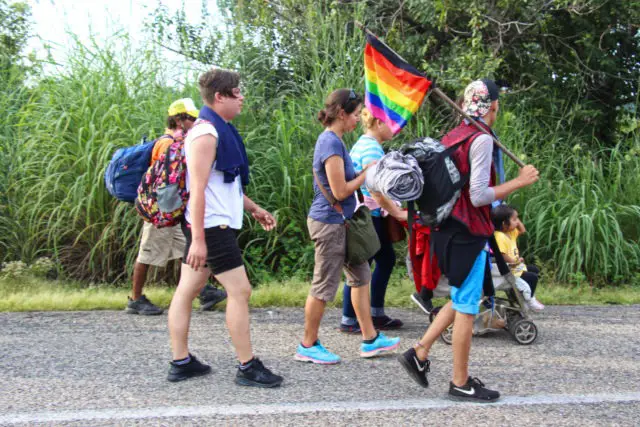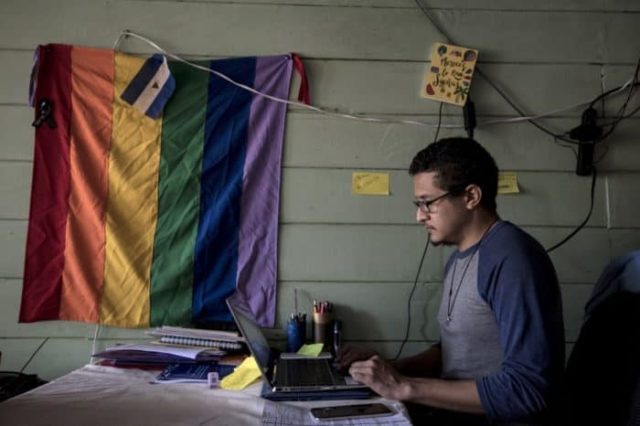
According to the “LGBTI Refugee Institute for Central America”, up to 10% of the 5,000 refugees in Costa Rica are people from the LGBTI community. Yassuri Potoy Ortiz, a young transgender woman, was an advanced nursing student when the 2018 protests against the Daniel Ortega government broke out in her native Nicaragua.
She had never been involved in politics, but seeing the repression suffered by the elderly and students in the first days of the protests, she set out to attend to the victims of the police action. Paying a high price for her humanitarian aid: she was expelled from the public university and her family began to suffer threats. Faced with these risks, she fled to Costa Rica, as did tens of thousands of Nicaraguans who escaped repression.
Hundreds of Central Americans from the LGBTI community have fled persecution and violence in their countries of origin. “Part of the reason I decided to leave my country was because of the inhumane way they treated people in prisons, where many people from the LGBTI community were victims of abuse, torture, mistreatment, and transwomen were victims of denigration, by exposing their naked bodies to be mocked,” Potoy told at her home in a rural town of the Costa Rican Caribbean. “If I stayed in Nicaragua, sooner or later they would jail me,” said the young woman, who did not want to reveal her age.
Fleeing violence like her’s, hundreds of Sexually Diverse Central Americans have found refuge in Costa Rica, a historically conservative and religious country that has taken slow steps to recognize the rights of the LGBTI population, such as the recognition of equal marriage, which came into force last May.
Honduran Dennis Castillo, 35, was one of the first LGBTI Central Americans to receive refugee status in Costa Rica due to the persecution she had suffered in her country of origin for her activism in the LGBTI rights movement. “I arrived in Costa Rica in 2012 when I decided to flee Honduras,” Castillo told. Four years earlier, she had witnessed the murder of a colleague in an organization that defends the rights of the sexually diverse, and after filing a “hate crime” complaint, she received threats, harassment, and persecution.

“In Honduras, LGBTI people are persecuted, there are more than 370 registered crimes from 2008 to 2019, and so far this year the number of crimes has increased much more,” said Castillo, who leads the LGBTI Refugee Institute for Central America in Costa Rica (IRCA Open House). She estimates that up to 10% of the 5,000 refugees are LGBTI. The country, with a population of 5 million, provides asylum to more than 400,000 foreigners.
“In Costa Rica, there is not that magnitude of crimes. There are some discrimination and violence against the sexually diverse population, but Costa Rica has adhered to the conventions that ensure respect and protection for refugees and LGBTI people, it has a long history of assisting victims of forced displacement and a strong legal framework,” Castillo explained.
It was those same conditions that attracted Carlos Daniel Berríos, a 28-year-old Nicaraguan student and human rights defender, who left his country amid the 2018 protests, as did Yassuri Potoy Ortiz. Son of militants from the Sandinista National Liberation Front (FSLN), of President Ortega, Berríos said that in Nicaragua “if you are from the
community of sexual diversity, institutional, physical, economic and symbolic violence multiplies”.
Upon leaving Nicaragua, Berríos continued his human rights activism at the Central American level, while pursuing a master’s degree in Political Science at the University of Costa Rica. “Costa Rica continues to present conditions to defend human rights. In Central America, activists who appear dead, extrajudicial executions, political prisoners, all have become too common,” he lamented.
Even so, Yassury Potoy Ortiz is afraid to reveal where she lives, in a small rural town where she teleworks for an organization that supports migrants and engages in activism with the “LGBTI NGO Mesa y Articulación”, which supports migrants from that community.
“I do not feel entirely safe because people loyal to Ortega have come to Costa Rica and are capable of doing many bad things, especially when the defense of LGBTI people and demanding freedom for political prisoners has been assumed,” said Potoy Ortiz.


